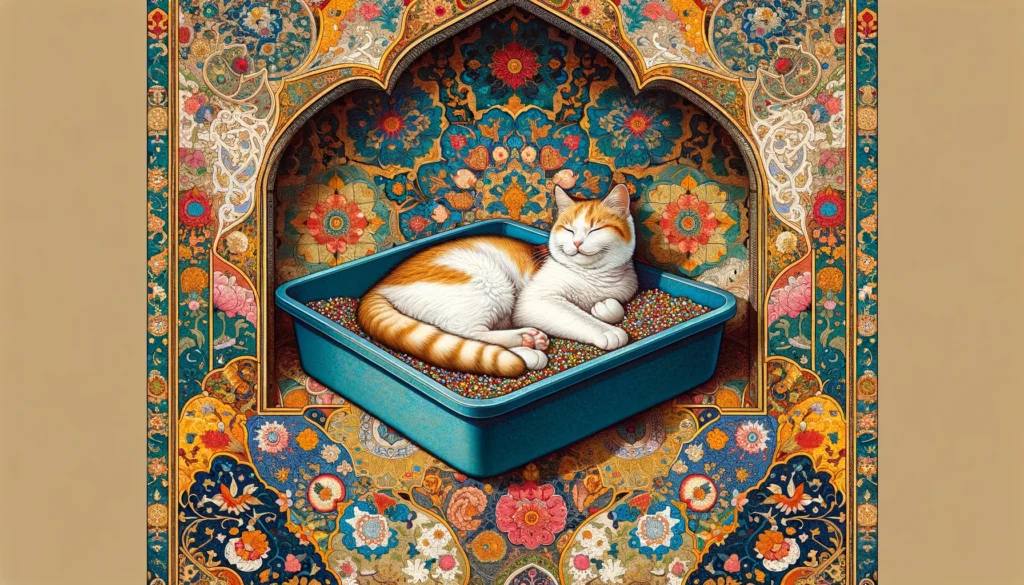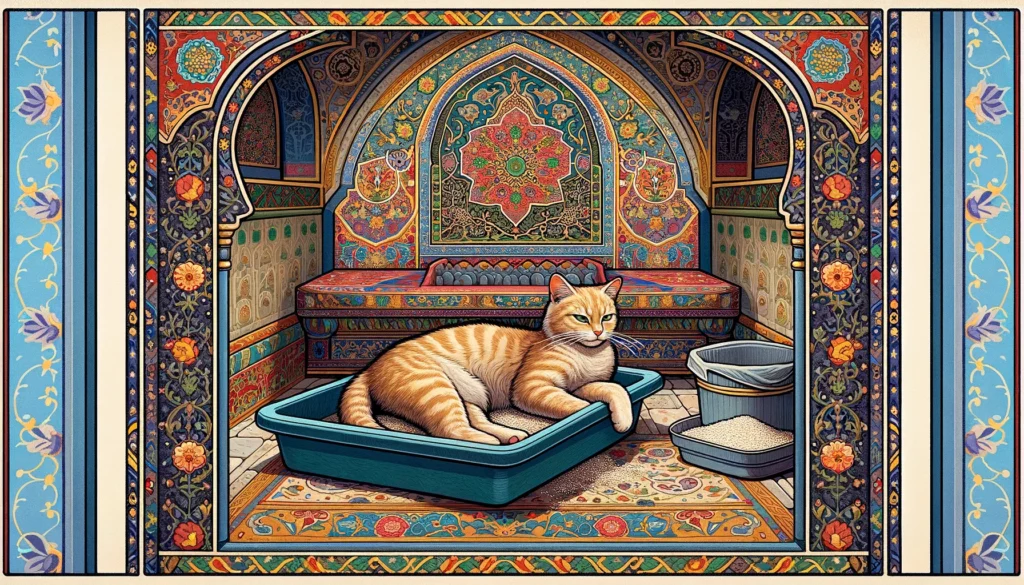Have you ever wondered, “why is my cat laying in the litter box?” This behavior is more than just a quirky habit. It could be a sign your furry friend is trying to tell you something about their cat litter needs or their health.
Unraveling this mystery isn’t just about curiosity; it’s about ensuring your cat’s happiness and well-being. Let’s dive into some insightful tips on decoding this peculiar behavior.
- Check the cleanliness of their litter box; a tidy space can make all the difference.
- Observe for signs of stress or discomfort; your cat’s actions are a window into their feelings.
- Consult with a vet if this behavior persists; it’s always better to be safe and informed.
Transitioning from confusion to understanding, we’ll explore the reasons behind this fascinating behavior. Ready to become a detective in the world of cat behavior? Let’s get started!
- Key Takeaways: Decoding Your Cat’s Litter Box Habits
- Understanding Your Cat’s Litter Box Behavior
- Health Implications of Litter Box Lounging
- Behavioral Factors Affecting Litter Box Use
- Solutions and Preventative Measures
- Frequently Asked Questions
- Further Reading
- Wrapping It Up: Why Your Cat Chooses the Litter Box as a Lounge
Key Takeaways: Decoding Your Cat’s Litter Box Habits
- Understanding Their Behavior: Recognizing why your cat prefers the litter box for lounging is crucial for their overall health and emotional well-being.
- Health and Comfort: Regular cleaning and the right litter type can make the litter box more appealing, while also monitoring for any signs of health issues.
- Environmental Influence: Stress, anxiety, and changes in the household or routine can impact your cat’s litter box habits. Providing a stable, quiet environment is key.
- Actionable Strategies: Implementing behavioral modification techniques and ensuring a stress-free environment can encourage proper litter box use.
You may also like – Why Do Cats Play In Their Litter Box? 8 Things to Know
Understanding Your Cat’s Litter Box Behavior
Recognizing why your cat is laying in the litter box is crucial for their health and happiness. Here’s what might be happening:
- Cats are clean animals; a dirty box might just be a no-go zone.
- Your cat might prefer a certain type of litter; they’re picky!
- The location of the litter box can also affect their comfort.
The Science Behind Litter Box Lounging
Cats seek comfort and safety, but litter box behavior can also signal health issues. Let’s dig into the why:
- Health problems might make the box feel safer.
- They could be marking their territory, especially in multi-cat homes.
- Sometimes, it’s all about finding a quiet retreat.
Common Reasons for Litter Box Resting
From stress in cats to seeking cat comfort zones, various factors influence this behavior. Exploring these can help:
- Stress or anxiety can push cats toward more secluded spots.
- Older cats or those with mobility issues might find the box easier to access.
- The box could simply be in a spot they love hanging out in.

Health Implications of Litter Box Lounging
When asking why does my cat rest in the litter bin, consider potential feline urinary problems and other health concerns. It’s not just about comfort; it’s a health check:
- Frequent litter box visits may hint at urinary tract infections (UTIs).
- Lethargy combined with litter box lounging could signal something more serious.
- A sudden change in litter box habits warrants closer observation.
Identifying Signs of Feline Diseases
Litter box cleanliness and monitoring can unveil early signs of feline diseases. Keep an eye out for:
- Changes in litter box usage, like more frequent or infrequent visits.
- Signs of discomfort, such as meowing or hesitation, when using the box.
- Unusual litter box behaviors, including prolonged sitting or lying, could indicate discomfort or distress.
When to Consult a Veterinarian
Cat health is paramount, and certain behaviors necessitate a professional evaluation. Here’s when to make that call:
- If there’s no improvement after cleaning the litter box and making it more appealing.
- When you notice any signs of illness, such as changes in appetite or energy levels.
- Consistent or increasingly odd litter box habits might mean it’s time for a vet visit.

Behavioral Factors Affecting Litter Box Use
Beyond health, behavioral issues and cat anxiety play roles in why cats lay in their litter boxes. Let’s peek into their world:
- New pets or people in the house can make your cat feel uneasy.
- Too much noise or activity near their litter space? Big no-no for a stressed kitty.
- Sometimes, they just want a spot that feels safe and private, away from the hustle.
Stress and Anxiety in Cats
Understand how stress in cats can lead to seeking refuge in their litter box. It’s their safe zone:
- Changes in the family, like a new baby or another pet, can spike their stress levels.
- A move to a new house or even rearranging furniture might unsettle them.
- Loud sounds or a hectic household can push them towards quieter, enclosed spaces.
The Impact of Environment and Routine
Changes in litter types or disruptions in home life can affect your cat’s litter box habits. Stability is key:
- Switching to a new litter type suddenly? This might not sit well with your feline friend.
- Cats thrive on routine – meal times, playtimes, and yes, even litter box times!
- Ensure their litter box is in a calm, accessible spot where they feel secure venturing into.

Solutions and Preventative Measures
Addressing why your cat is sitting in the kitty litter involves both environmental adjustments and health interventions. Let’s get to fixing:
- Keep the litter box spotless; a clean space is more inviting.
- Experiment with different litter types; your cat might have a preference.
- Make sure the box is in a quiet, stress-free zone.
Enhancing Litter Box Appeal
Regular cleaning and choosing the right litter types are key to encouraging proper litter box use. Here’s how to make the litter box the place to be:
- Scoop daily and change the litter regularly to keep it fresh.
- Consider a litter box with higher sides if spills or “kicking” litter out is an issue.
- Place the litter box in a low-traffic area where your cat feels safe.
Behavioral Modification Techniques
From feline litter box training to establishing a stress-free environment, various strategies can help. Let’s look at some tactics:
- Gradual introduction to new types of litter or new locations for the box can ease transitions.
- Positive reinforcement, like treats and praise, can encourage proper litter box use.
- Ensure your cat has plenty of playtime and personal space, reducing stress and anxiety.

Frequently Asked Questions
Q: What could cause my cat to suddenly start using the litter box as a bed?
A: The primary reasons for a cat to begin lying or even sleeping in their litter box are stress and health issues. Cats are known for their cleanliness, so choosing to rest in a place like a litter box is unusual and often indicates that they are seeking comfort or are in distress.
Q: Why is my cat sitting in the litter box without urinating?
A: This behavior often signals that your cat is experiencing a health issue and should be examined by a veterinarian promptly. Inability to urinate can indicate serious conditions such as obstructions or urinary tract infections, requiring immediate attention.
Q: What are the reasons my cat frequents the litter box?
A: Frequent visits to the litter box can be caused by various health problems, including urinary tract infections, bladder stones, or environmental stress. Most conditions leading to increased litter box use can be treated or managed with veterinary care and preventive strategies.
Q: How can I discourage my kitten from sleeping in the litter box?
A: To prevent your kitten from sleeping in the litter box, ensure they have a comfortable, safe, and quiet sleeping area. Sometimes, kittens seek the familiar scent and enclosed space of a litter box for security. Providing a cozy bed in a secure environment can encourage them to sleep there instead.
Further Reading
Why Is My Cat Laying in the Litter Box? Understanding the Reasons and Solutions!
Litter Love: The Real Reason Your Cat’s Lying In Their Litter Box
Why is My Cat Laying in the Litter Box?
Cat Laying In Litter Box: Causes And Solutions
6 Reasons Cats Sit In Their Litter Box & When To Worry
Why Is My Cat Laying in the Litter Box?
Wrapping It Up: Why Your Cat Chooses the Litter Box as a Lounge
Understanding why your feline is lounging in the sand box requires attention to their health, environment, and emotional well-being. It’s not just about a quirky habit; it’s a glimpse into their needs and feelings. Here’s a quick recap:
- Keep their litter box clean and suited to their preferences.
- Stay alert for signs of health issues or stress that might drive them to the box.
- Provide a safe, quiet space for their litter box to make it welcoming.
So, why is my cat laying in the litter box? It’s a question that uncovers layers about their world we might not have considered. By tuning into their habits and making a few adjustments, we can ensure our furry friends feel secure, happy, and healthy.
Now that you know, what changes will you make to give your cat the best care?


